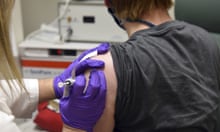Studies around the world have confirmed that steroids can save lives in the Covid-19 pandemic, leading to new recommendations from the World Heath Organization that doctors should give them to severely ill patients.
In June, the Recovery trial run in most NHS hospitals and led by Oxford University found that the lives of one in eight people sick enough from Covid-19 to need a ventilator could be saved by a steroid called dexamethasone.
Now, combined results from that trial and six others have confirmed those findings and established that at least one other equally cheap and widely available steroid, hydrocortisone, also saves lives.
The drugs reduce the risk of death in these seriously ill patients by 20%, according to a meta-analysis of the results of the seven trials covering a total of 1,703 patients, published in the Journal of the American Medical Association. Three of the trials have also been published separately in the journal.
“Steroids are a cheap and readily available medication, and our analysis has confirmed that they are effective in reducing deaths amongst the people most severely affected by Covid-19,” said Jonathan Sterne, a professor of medicine and epidemiology at Bristol University and the lead author of the meta-analysis.
“The results were consistent across the trials and show benefit regardless of age or sex.”
The pooled results add weight to the Recovery trial findings because they are from a diverse group of patients in several countries, including Brazil and France. “We’ve got a consistent message from all these trials, and the effect of hydrocortisone appears consistent with the effect of dexamethasone,” he said.
Martin Landray, professor of medicine and epidemiology at Oxford University and deputy chief investigator of the Recovery trial, said the time for doctors to use steroids was the moment they reach for the oxygen cylinder for a patient who needs help with breathing, without waiting for the move to a ventilator.
The drugs are already being widely used. In May, about 7-8% of Covid hospital patients were getting dexamethasone, and by the end of June it was about 55%, said Landray. “This is not a drug that costs $3,000 to reduce a hospital stay by a few days. This is not anywhere near the sorts of costs in many, many other areas of acute and preventive medicine. So this is a widely available, widely useful strategy. I mean, treating people with dexamethasone is, give or take, 60 quid to save a life.”
The hydrocortisone trials were led in the UK by Prof Anthony Gordon, of Imperial College London, an intensive care specialist. Patients were enrolled in 88 hospitals. They began to look at hydrocortisone because it is an anti-inflammatory drug. In severe cases of Covid-19, the immune system can go into overdrive, attacking the body’s own tissues and causing inflammation.
“In intensive care we often use steroids to treat inflammatory conditions and severe infections,” he said. “But we know they can also suppress the immune system, and with a new virus that none of us were immune to, that could make things worse.”
They stopped recruiting to the trial when the Recovery results came out in June and looked at their own data, which came to much the same conclusions.
The NHS and other healthcare providers around the world are likely to adopt the use of either dexamethasone or hydrocortisone for severely ill Covid patients, depending on which drug is more available and familiar to doctors.
The NHS chief executive, Sir Simon Stevens, said: “One of the distinctive benefits of having our NHS is that we’ve been able to mobilise quickly and at scale to help researchers test and develop proven coronavirus treatments. Just as we did with dexamethasone, the NHS will now take immediate action to ensure that patients who could benefit from treatment with hydrocortisone do so, adding a further weapon in the armoury in the worldwide fight against Covid-19.”
Jonathan Sterne emphasised it was “really very unusual in science” for groups working on separate trials to combine their results together in this way rather than publishing separately, as they had done in order to establish whether the drugs can save lives in the pandemic.








